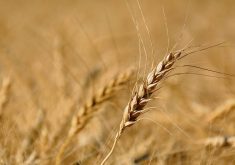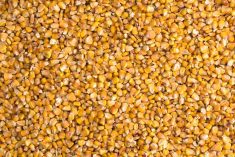Checkoff dollars paid on Prairie wheat and Saskatchewan and Manitoba barley will yield slightly less of a tax credit for eligible farmers this spring.
The Western Grains Research Foundation (WGRF), which administers the wheat and barley checkoff, said Thursday that the tax credit percentage for farmers who paid into the checkoff fund in 2008 will be 80 per cent for wheat and 82 per cent for barley.
That’s down from 82 and 85 per cent respectively for the 2007 tax year.
Wheat growers in all three Prairie provinces can thus claim 82 per cent of their checkoff payment toward a federal Scientific Research and Experimental Development (SR+ED) tax credit for the 2008 tax year, at a rate of 20 per cent (35 per cent for corporations).
Read Also

Senft to step down as CEO of Seeds Canada
Barry Senft, the founding CEO of the five-year-old Seeds Canada organization is stepping down as of January 2026.
So for example, if a farmer paid $300 in wheat checkoffs in 2008, the eligible amount would be calculated by taking 80 per cent (the wheat percentage) of the $300, or $240.
The farmer, filing as an individual, would get 20 per cent of that $240, or $48, as a tax credit, while the same farmer filing as a corporation would get 35 per cent as a tax credit, or $84.
Since the Alberta Barley Commission collects Alberta barley growers’ checkoff dollars, Alberta barley checkoffs will be subject to a different tax credit rate than those on barley in Manitoba or Saskatchewan.
“The WGRF and other commodity groups worked hard to have government recognize the significant investment from farmers into R+D and make this tax credit available,” foundation executive director Lanette Kuchenski reiterated in a release Thursday.
“Hopefully farmers use this opportunity and talk to their accountants about the advantages it holds for them.”
The WGRF also collects research revenue from Canada’s two main railways, charged to them by the federal government in years when both or either exceed their allowable revenue cap for handling Prairie grain.
Those overages rose substantially in the last crop year to a total of $68.7 million due to a recalculation of railways’ hopper car maintenance costs.
Though those penalties are now under appeal by the two railways, they have led to some debate among and between farmer organizations over whether farmers should instead get some of that cash back directly.















